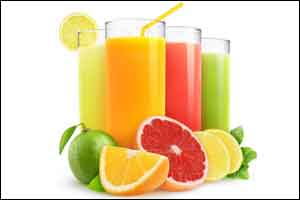- Home
- Editorial
- News
- Practice Guidelines
- Anesthesiology Guidelines
- Cancer Guidelines
- Cardiac Sciences Guidelines
- Critical Care Guidelines
- Dentistry Guidelines
- Dermatology Guidelines
- Diabetes and Endo Guidelines
- Diagnostics Guidelines
- ENT Guidelines
- Featured Practice Guidelines
- Gastroenterology Guidelines
- Geriatrics Guidelines
- Medicine Guidelines
- Nephrology Guidelines
- Neurosciences Guidelines
- Obs and Gynae Guidelines
- Ophthalmology Guidelines
- Orthopaedics Guidelines
- Paediatrics Guidelines
- Psychiatry Guidelines
- Pulmonology Guidelines
- Radiology Guidelines
- Surgery Guidelines
- Urology Guidelines
Consumption of 100% fruit juice not associated with increased risk of diabetes

It has been found in a recent meta-analysis that consumption of 100% fruit juice has a neutral effect on glycaemic control or measures of insulin resistance. The study has been published in the Journal of Nutritional Science.
Dr.Murphy MM and associates systematically reviewed and quantitatively summarised results from randomised controlled trials (RCT) examining effects of 100 % fruit juice on glucose-insulin homeostasis.
Researchers conducted a meta-analysis of 18 randomised controlled trials (RCTs) identified through a literature search on PubMed and Embase databases, supplemented with an additional review of reference lists.Eligible studies were identified from a systematic review of PubMed and EMBASE and hand searches of reference lists from reviews and relevant papers. Using data from eighteen RCT, meta-analyses evaluated the mean difference in fasting blood glucose (sixteen studies), fasting blood insulin (eleven studies), the homeostatic model assessment of insulin resistance (HOMA-IR; seven studies) and glycosylated Hb (HbA1c; three studies) between the 100 % fruit juice intervention and control groups using a random-effects model.
Compared with the control group, 100 % fruit juice had no significant effect on fasting blood glucose (−0·13 (95 % CI −0·28, 0·01) mmol/l; P = 0·07), fasting blood insulin (−0·24 (95 % CI −3·54, 3·05) pmol/l; P = 0·89), HOMA-IR (−0·22 (95 % CI −0·50, 0·06); P = 0·13) or HbA1c (−0·001 (95 % CI −0·38, 0·38) %; P = 0·28). Results from stratified analyses and univariate meta-regressions also largely showed no significant associations between 100 % fruit juice and the measures of glucose control.
The researchers concluded that Overall, findings from this meta-analysis of RCT suggest a neutral effect of 100 % fruit juice on glycaemic control. These findings are consistent with findings from some observational studies suggesting that consumption of 100 % fruit juice is not associated with increased risk of diabetes.
"Our findings are consistent with some observational studies suggesting that consumption of 100 % fruit juice is not associated with increased risk of diabetes," the authors said. They call for further high-quality studies on glucose-insulin homeostasis measures to ascertain the effects of 100% fruit juice on diabetes risk.
For further reference log on to :

Disclaimer: This site is primarily intended for healthcare professionals. Any content/information on this website does not replace the advice of medical and/or health professionals and should not be construed as medical/diagnostic advice/endorsement or prescription. Use of this site is subject to our terms of use, privacy policy, advertisement policy. © 2020 Minerva Medical Treatment Pvt Ltd